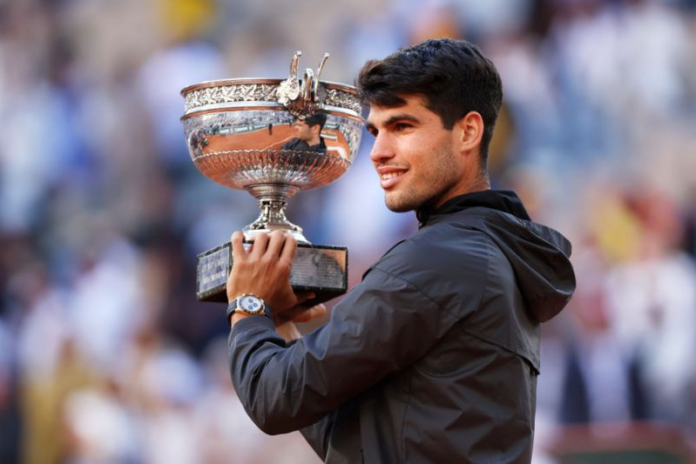Spain’s Carlos Alcaraz won the French Open title many thought he was destined to claim by edging a scrappy five-set final against Germany’s Alexander Zverev.
Third seed Alcaraz won 6-3 2-6 5-7 6-1 6-2 on the Roland Garros clay.
He was below the level of confidence and consistency which enabled him to win his first two major finals – at the US Open in 2022 and last year’s Wimbledon.
But the 21-year-old came through to become the youngest man to win Grand Slam titles on all three surfaces.
Clay was the surface which Alcaraz grew up playing on in his hometown of Murcia and the French Open event he dreamt of winning.
He instantly fell on to his back – in a celebration akin to 14-time champion Rafael Nadal – when he took his first match point after four hours and 19 minutes with a forehand winner.
“I used to watch the tournament on television and I’m now lifting the title,” said Alcaraz, who was presented with the trophy by six-time champion Bjorn Borg.
Fourth seed Zverev, who was looking to finally land his first Grand Slam title, presented a formidable opponent after a 12-match winning streak on the red dirt.
But the 27-year-old’s wait for the major title he has long been predicted to win continues after his second defeat in a Grand Slam final.
How momentum and quality fluctuated in strange final
Both men had reason to be nervous and it showed in a strange match where neither regularly played anywhere near their best.
For Alcaraz, he was aiming to win the tournament which he used to run home from school to watch.
Zverev, meanwhile, was aiming to fulfil the talent many saw when the prodigious teenager followed older brother Mischa – a former Australian Open quarter-finalist – around on tour.
An edgy Zverev opened up with two double faults on his way to losing serve but broke back after uncertain hitting from Alcaraz.
Alcaraz began to settle as he soaked up Zverev’s powerful groundstrokes and took the German’s serve again for a 3-2 lead. Now starting to strut, the crosscourt forehand winner which sealed the set illustrated his growing confidence.
In the second set Zverev found more depth and bounce with his return. A despondent-looking Alcaraz struggled to cope and lost five games in a row from a 2-1 lead.
The level and intensity increased in what both players knew was a pivotal third set. Alcaraz broke to love pretty much out of nowhere – having lost the previous 14 points on Zverev’s serve – but momentum and quality continued to fluctuate.
From a 5-2 deficit, Zverev levelled for 5-5 and broke a tense Alcaraz for 6-5 before serving out for the lead.
Another twist came in the fourth. This time, Zverev’s level dipped sharply and Alcaraz, despite needing treatment for a leg injury, ran away to force a decider.
Alcaraz comes through after contrasting build-ups
Coming into Roland Garros, Alcaraz had not played for a month because of the pain in his right forearm and continued to wear a support throughout the tournament.
He had missed the Italian Open as a consequence and arrived in Paris with only a run to the Madrid Open quarter-finals under his belt on clay.
In contrast, Zverev had prepared by winning the prestigious Rome title.
Their varying paths to the tournament, and the draw, meant it was a difficult final to call.
That remained the case when the pair started the deciding set.
By now Zverev had spent almost 24 hours on court in the tournament – having taken the longest route to the French Open final since records began in 1991.
After going a break behind at 2-1, the Olympic champion dipped into his mental and physical reserves again to force five break points in the fifth set, but could not take any of them as Alcaraz survived.
When Alcaraz broke for 5-2, with the help of a sensational backhand crosscourt winner, Zverev looked utterly demoralised and could not recover.
“It’s been amazing – the atmosphere, the support has been amazing,” said Zverev, whose defeat came two days after his trial over domestic abuse allegations was discontinued.
“I really love to play on this beautiful court, one of my favourite courts on the tour.
“I’ll be back next year.”

